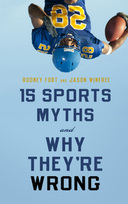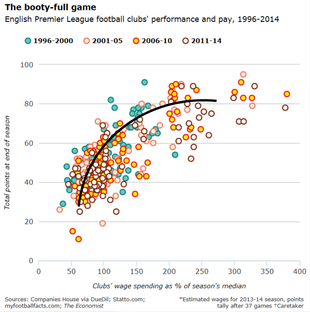In this post I'm going to look at some of the sports economics issues raised in Homer at Bat. Not surprisingly, this brilliant episode has been named as the best sports episode by Bleacher Report. It revolves around the idea of buying success in sport.
In a striking similarity to Robert Redford in The Natural, Homer makes himself a bat and helps lead the Springfield Nuclear Power Plant softball team to an undefeated season. In the championship game they face Shelbyville Power Plant owned by Aristotle Amadopoulous. Monty Burns bets Amadopoulous $1m that Springfield will be successful in their contest. In an effort to increase his chances of winning, Burns hires a collection of Major League Baseball players and gives them jobs in the power plant. Due to bad luck, and some strange behaviour on the part of Monty Burns, all but one of the MLB ringers are unable to take their place in the game. The one exception is Darryl Strawberry - the player taking Homer's position. With the score tied and bases loaded with two outs in the bottom of the ninth inning, Burns replaces Strawberry with Simpson. Burns proceeds to confuse Homer with his signals. The confused Homer is hit on the head with the pitch bringing about the winning run.
At the moment, from a European perspective, it is hard to recall the episode and not think about the UEFA Financial Fair Play rules. These rules arose, at least in part, to stop wealthy owners from investing large sums of money buying up players and potentially destablising the game. This week the media was awash with speculation that Manchester City and Paris Saint Germain were facing server penalties for breaching the rules (here). However, what I want to focus here is the issue of buying success or the cost of buying success.

A similar analysis is presented in a superb piece in the latest The Economist. - it can be accessed through their blog on sport called Game Theory. The graph below is reproduced from the article (although I have imposed the solid black production function that is available in some versions). One could apply the following few lines from Fort & Winfree, "Depending on the sport, it is usually easy to win a few games. However, wins get harder and harder to come by for good teams".
It would be fair to say that Fort & Winfree are not overly impressed by Michael Lewis and Moneyball. When discussing the cost of winning they say "We can't resist pointing out that the Oakland A's are also a bit below this more reasonable line (they were just above the earlier less reasonable solid line representation)." I'm guessing there is little between Billy Beane and Monty Burns.
This brings us back to Darryl Strawberry. Burns brought Strawberry to the power plant to replace Homer in the softball team. This is the same Strawberry that features so prominently in Moneyball (the book rather than the movie). The book explains how the New York Mets had the first draft pick in 1980. They were considering Beane and Strawberry. It seems the Mets head coach wanted Beane but they selected Strawberry with their first pick because of influence from Sports Illustrated. They ended up getting both. Strawberry was their first pick and Beane was their second pick. It seems Sports Illustrated got it right - but for the wrong reason. Just like Burns got it right in replacing Strawberry with Simpson.

 RSS Feed
RSS Feed